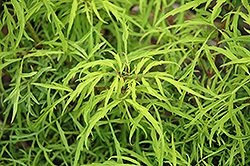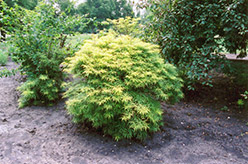Plant Search
Goldenlocks Elder
Sambucus racemosa 'Goldenlocks'
Height: 3 feet
Spread: 3 feet
Sunlight:
![]()
![]()
Hardiness Zone: 2
Other Names: European Red Elder
Description:
An interesting and colorful shrub, very unlike the species; forms a dwarf and compact mound, ideal for garden detail use; features fine textured golden foliage all season long and showy creamy white flowers in spring followed by red berries
Ornamental Features
Goldenlocks Elder features showy clusters of lightly-scented creamy white flowers held atop the branches in mid spring. It has attractive yellow deciduous foliage. The deeply cut ferny compound leaves are highly ornamental but do not develop any appreciable fall colour. The red fruits are held in abundance in spectacular clusters in early summer.
Landscape Attributes
Goldenlocks Elder is a dense multi-stemmed deciduous shrub with a more or less rounded form. Its relatively fine texture sets it apart from other landscape plants with less refined foliage.
This shrub will require occasional maintenance and upkeep, and is best pruned in late winter once the threat of extreme cold has passed. It is a good choice for attracting birds to your yard. Gardeners should be aware of the following characteristic(s) that may warrant special consideration;
- Disease
Goldenlocks Elder is recommended for the following landscape applications;
- Accent
- Mass Planting
- General Garden Use
Planting & Growing
Goldenlocks Elder will grow to be about 3 feet tall at maturity, with a spread of 3 feet. It tends to fill out right to the ground and therefore doesn't necessarily require facer plants in front. It grows at a fast rate, and under ideal conditions can be expected to live for approximately 30 years.
This shrub does best in full sun to partial shade. It is very adaptable to both dry and moist locations, and should do just fine under typical garden conditions. It is not particular as to soil type or pH. It is highly tolerant of urban pollution and will even thrive in inner city environments. This is a selected variety of a species not originally from North America.



